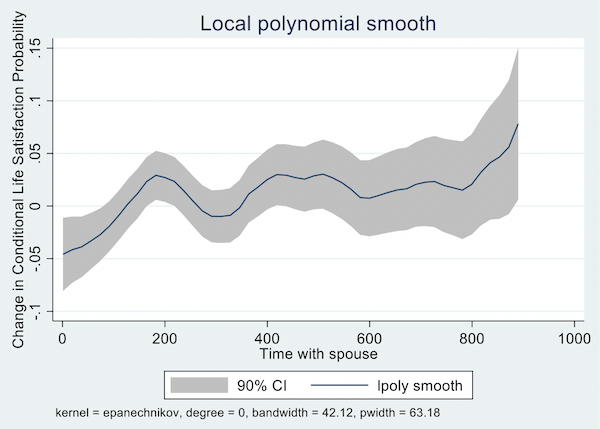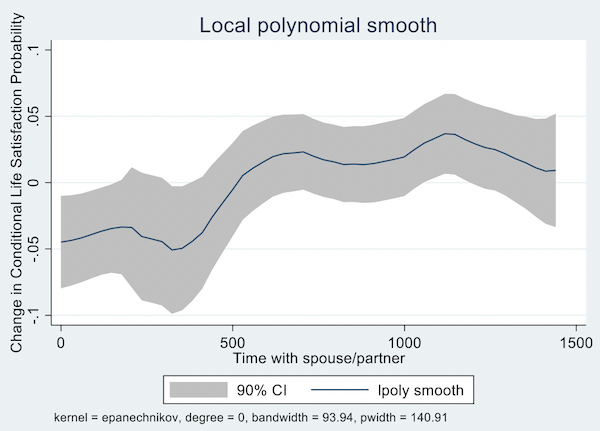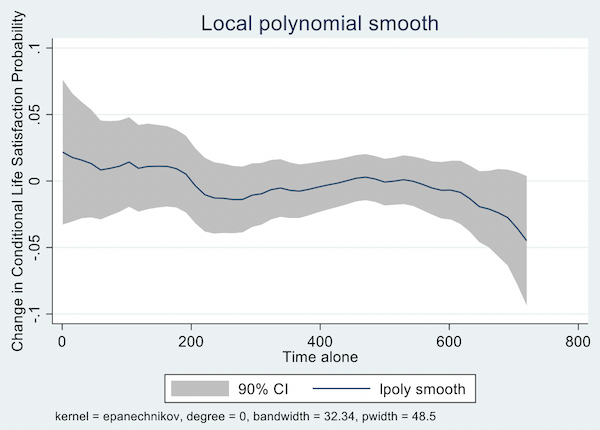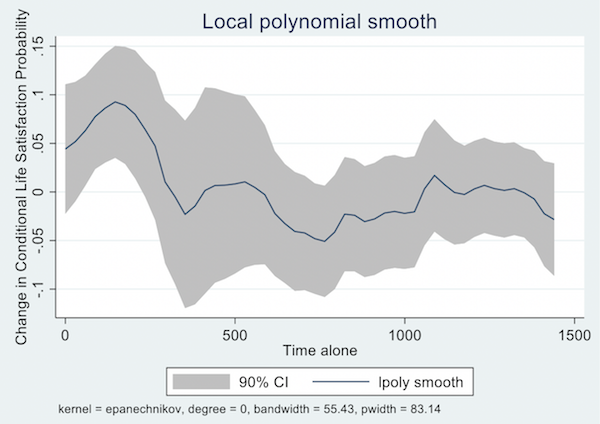Lambert here: Sorry for the lack of original posts, but our continuing server-side difficulties have made production really, really difficult. Hopefully, we will be back to normal soon.
By Daniel Hamermesh, Distinguished Scholar, Barnard College; Network Coordinator, IZA. Originally published at VoxEU.
The Covid-19 pandemic has changed not only how people spend time, but with whom they spend it. Partnered people may be spending more time with a spouse or cohabitor while singles spend more time alone. This column investigates how these changes in time allocation might affect individual feelings of wellbeing. Time diaries from the US and the UK suggest that married couples compelled to spend more time together may experience increased happiness, while the crisis could take an emotional toll on unmarried individuals forced to spend more time alone.
The Covid-19 pandemic has created a remarkable variety of unexpected short-term and possibly longer-term effects on people’s behaviour, the way they work, and their capacities for work. Debates have arisen about how to deal with a resurgence of the pandemic (Gros 2020); economists have rightly considered the possible long-term impacts on children’s development (Fuchs-Schündeln et al. 2020); and, getting closer to the subject discussed here, they have even examined how the pandemic has contributed to anxiety about the labour market and the economy generally (Barrios and van der Wielen 2020).
In a recent paper (Hamermesh 2020), I consider how the pandemic’s substantial effects on the way people work and live might have altered their feelings of general wellbeing. There is no doubt that what we did and with whom we did it changed in wealthy countries during periods of lockdown in spring 2020, and these changes seem likely to be repeated with lockdowns re-instituted this autumn. It is not only the location of work that has been changed. Continued closings or partial shutdowns of restaurants, hotels, theatres, museums, and sports arenas have altered the locations of people’s leisure activities. We are spending more time at home, whether working or not.
Economists assume that people seek to make themselves as happy as possible – given their ability to earn an income and the other non-work income to which they have access – by spreading their spending across various goods and services. Becker (1965) pointed out that spending also takes time. A one-week holiday could be taken ‘on the cheap’ camping in a national park, or the same-length holiday could be spent traveling to the Loire Valley, eating at Michelin-starred restaurants, and staying in luxury hotels. The same amount of time, but significantly more money-per-hour spent during the Loire holiday.
Who you spend time with also affects your happiness. The same activity can be enjoyed with different people present. A sex act could be performed with one’s spouse, one’s friend, a stranger, or by oneself. Same time, same money spent, but with a different person (or no one else) present; and in each case the enjoyment might differ.
The altered constraints on whom we spend time with imposed by the Covid-19 crisis might have affected human happiness. Regrettably, we do not yet have data on how people spent time and with whom they spent it during the crisis period. But we do have lots of data on how people’s satisfaction with life differs depending on what they do, and with whom they do it, that allow us to simulate those effects. In 2012 and 2013, the US collected time diaries – minute-by-minute recollections of what people were doing at every moment of the previous day and, for most activities, who if anyone else was present. The UK collected similar diaries in 2014–15.
I examined the life satisfaction of all married individuals with no children at home (typically younger couples or those age 50+) of whom there were 4,702 in the US and 1,870 in the UK; and of all single individuals aged 30 and over (to exclude young people with roommates), of whom there were 6,848 in the US and 1,002 in the UK. Both sets of data also contain information on people’s satisfaction with their lives, rated on an 11-point scale in the US and on a 7-point scale in the UK. I designated as ‘satisfied with life’ married individuals who were on the upper parts of the life-satisfaction scales, 56% of US spouses and 72% of UK spouses. Among single individuals, 42% of US singles and 51% of UK singles.
The time diaries in the US summarise the amounts of time spent alone, with friends, with other people, other relatives, or a spouse during waking hours; in the UK, they include information on time spent alone, with other people, or with one’s spouse over the entire day. Not surprisingly, in both countries singles spend much more time alone than married individuals do, and also more time with other people. Married people spend as much time with their spouse as they do alone, and much more time with their spouse than they spend with other people.
In each case, I adjust for a large number of other factors that might alter feelings of satisfaction with life – including age, level of education, race/ethnicity, household income, region of residence and (for the US) immigration status. Most important, for each person I adjust for how they spent their 24 hours of the day across paid work, home production, sleep, other personal care, television-watching, and other leisure activities – a useful categorisation described by Hamermesh (2019). What is left is an ‘other things equal’ measurement of the impact that whom time is spent with has on life satisfaction.
Accounting for all these other factors, married people are more satisfied with life if they spend more time with their spouse, and less satisfied the more time they spend alone. Additional time spent with other people raises their life satisfaction, but by much less than does additional time with their spouse. Among singles, other things equal, the biggest changes (reductions) in their satisfaction with life occur when they spend more time alone.
Among marrieds, the average person in the US spent 4.5 of his or her waking hours engaged in activities for which the spouse was present; the average UK spouse spent 11.5 of each 24 hours with his/her spouse. Figures 1a and 1b demonstrate for the US and UK, respectively, how additional time spent with one’s spouse changes the probability that an individual is considered satisfied with life. In both countries, the best estimate is that more time spent with a spouse raises life satisfaction, albeit the increase is not uniform over the entire range of time spent (from zero hours in a day to 15 hours in the US and to 24 hours in the UK).
Figure 1 Flexible estimates of the effect of time with spouse on the change in life satisfaction among married individuals without children
a) US, 2012–13

b) UK, 2014–15

The average unmarried individual in the US spends over six waking hours alone, while the average UK unmarried person is alone for 11.5 hours of each day. Figures 2a and 2b demonstrate how additional time spent alone reduces an unmarried person’s satisfaction with life, although here too the (negative) effect of additional time varies as more time is spent alone. Spending more time alone in both countries reduces the likelihood that a person conveys satisfaction with life.
Figure 2 Flexible estimates of the effect of time alone on the change in life satisfaction among single individuals ages 30+ without children
a) US, 2012–13

b) UK, 2014–15

All of these effects are somewhat stronger and more significant statistically if we examine the impact of how and with whom people spent time on the entire ladder of responses rather than on the simple satisfied-or-not dichotomy. The main point is that additional time with one’s spouse makes a married person more satisfied with life, while additional time alone reduces single people’s life satisfaction.
The Covid-19 crisis has forced married couples to spend more time together (and less time alone and with others). It has forced single people to spend more time alone. We do not know how much more time in each case, so we have to guess. Let’s assume that among marrieds, the time reported as being spent with others has been shifted to time with one’s spouse, and that one third of work time has been shifted to television-watching. In that case, using the estimates from the US and UK time-diary data, the average spouse would be six percentage points more likely to report satisfaction with life, an increase of about 10% in the average percentage of spouses reporting that they are satisfied. Among singles, assuming that time spent with others was shifted to time alone and that one third of work time was switched to television-watching, the likelihood of stating that one is satisfied with life drops by 5%, also about a 10% change.
These simulations are based on assumptions about how people’s allocation of time might have changed during lockdowns and other Covid-19 induced restrictions. Making stronger assumptions, such as assuming that incomes are reduced by the Covid-19 crisis, reduces the simulated increase in spouses’ life satisfaction and exacerbates the estimated decline in the life satisfaction of unmarried people. Also, these simulations say nothing about how the fear of infection – the uncertainty about life – that the crisis may have induced could have altered people’s life satisfaction. They simply point out and, more important, estimate the extent to which married individuals forced to spend more time together may have been happier with their lives because they could spend more time with their favourite person, their spouse. And they demonstrate that the crisis may have had additional negative impacts on unmarried individuals by forcing them to spend more time alone.
References available at the original.


Covid has us all rethinking the way we live. I have a spouse, and when this stuff started, we sort of got ourselves in the frame of mind of, “Little House on Prairie”. LOL After 3 weeks, I got Cabin Fever. Not that I don’t want to enjoy my home, I just needed to bust out. Ended up enjoying a community cook out, with all of us 6 feet apart.
My GF/partner spent months together when the Bug hit, me acting as her personal assistant while she worked and Zoomed. We came out stronger for it, I’m happy to report. I also spent significant time alone when she went to visit her similarly isolated mother, the longest stretch was a solid month, and I really enjoyed it. The time kind of melted together, I would think it was Monday and it was Thursday and I went out of my way to avoid looking at the clock or calendar. It’s a bit other-worldy, which I’m always down for.
i’m anomalous in this respect.
early pandemic meant i actually went to town more…because i was the only one i could trust to be careful.
aside from that…and everybody being home all the time…not much changed for me.
everybody being home all the time was weird, at first…i was very used to spending most of my time alone.
suddenly having to “entertain”(amfortas’ version= direct the work,lol) was a major crimp on my doins…before, i had a routine, gliding through my chores and projects….and utterly timeless, as you say.
wife’s cancer had already weirded all this a year and a half before, of course….just not to this great extent.
hardest part for me has been having to be the DoomSayer…repeated admonitions about the Protocols, being careful, dealing with the various stages of grief(especially Bargaining) as everybody went through them at their own, chaotic, pace…
and having to repeat myself, at least weekly, that “no, it ain’t over…and it’ll get much worse before it gets what we’ll come to define as ‘better'”.
i hate being the bad cop,lol
whatever.
after a lifetime of high strangeness, this has definitely been my most challenging year.
I’ve been the StormCrow here too, my GF had to be gently guided (and occasionally sternly directed) into the world of chaos and uncertainty where I’ve been living for the past 40 plus years. Same with my small circle of friends: lots of dickering and horse trading with the Cosmos. If you want to make God laugh, take a stand against It. I told them it doesn’t work that way, mostly by example but sometimes with words. It’s amazing how childlike people can become in the face of tectonic change. I say this with love, they aren’t idiots, quite the opposite, but they were innocents. My own innocence, thrice skinned from my meat and hung to dance and flutter in a cold wind on a dead tree. What was left behind was a Fool and an Innocence that guided me through misdirection and grief and grinding, grinding experience. Now the Fool is the Magician.
As you say, a Grieving process, watching one’s old world and life gasping and clutching and expiring, a new one rising like a black flamed Phoenix, poisoned and croaking, talons slashing at the dreams and hopes you try to clutch to your chest. For my friends, the ripping pain of a freshly opened wound, for me, a familiar ache. Yet, I have to admit to occasionally being overcome with a sense of elation; we are witnessing the end of an Aeon in human history and even in horror there is beauty. The beauty of a crumbling mountain, of the joy, the Truth, of deep grief. My vision flattens as if all about me were strange Icon, bursting, pregnant with meaning. The old order must fall away for a new order to arise so that it in turn may fall. So it goes.
And time, how it rips by now, days are hours, weeks are days, months are weeks, the seasons hurtling by so quickly. Until I am alone, as I will be for the next week, a week of howling prayer and supplication to my gorgeous Father, wreathed in grapes and vine, smiling down upon His long wandering son. No work to trouble me, no schedule to meet. Then, time, haggard and pressed, will unfold away from itself into Time, the place of sheer existence:
Sometimes the clock
Is a mighty strong chain
And sometimes the clock
Is a thundering train
Sometimes the clock
Brings but heartache and pain
And sometimes the clock
Leaves a red bloody stain.
Begone! Begone! clock
I’ll tarry no more
Neath your strangling hands
And your sentinels score
For Time now approaches
With a sweet, silent roar
That shakes off my bonds
And let’s my heart soar.
And soon I will sing
And soon I shall gyre
The Air filled with incense
My sight filled with Fire
Sweet waves of Water
Earth ‘neath my feet
Mind like a spire
My Soul now complete!
My thoughts are with you, O my Brother on the Path, and with your Lady and your clan.
CDC doesn’t want people to get together for Thanksgiving. Instead, they appear to think you can go to an indoor restaurant, take in a movie, and then go to the bar. Can they spell cognitive dissonance?
https://www.npr.org/sections/coronavirus-live-updates/2020/11/19/936715870/dont-travel-for-thanksgiving-cdc-warns
https://www.cdc.gov/coronavirus/2019-ncov/community/organizations/business-employers/bars-restaurants.html
It just struck me that we are already in the jubilee and newest deal: CARES paid for a build out of new infrastructure (the great reset or upgrade, facilitating/ digitalizing remote work) albeit public-private-partnership at best (privatized gains, socialized losses), including pandemic management (we saw here at NC that vaccine development is driven by government) and even direct payments to taxpayers and the cascade of effects in the larger economy. The few months or more of forbearance plus the government payments were probably the jubilee already.
This has been a time when single people who are introverts suffer much less than other types of humans. But any type will find life so much better with a pet or two (or more!). Consider adopting a dog or cat from a shelter or a rescue group.
i enjoy spending time with geese…although i admit that it’s not for everybody.
They scare me. They bite! Well, kinda pinch hard.
I prefer wild swans over wild geese. :)
I believe there was research indicating that introverts have actually suffered more mental stress than extroverts during lockdown. It was speculated that extroverts are better at maintaining social contacts.
Just because you are an introvert doesn’t mean its healthy to be always alone. As an introvert, I’ve always seen social gatherings as like doing squats with bodyweight barbells. Unpleasant, but necessary for long term strength and resilience.
As a lifelong introvert, the observations you cite or make are mine. Being social to a degree is necessary, but it’s an effort usually. That is, I don’t get excited about it like some extroverts I know, yet I know I benefit.
I feel that this pandemic will change my social life significantly. I was directly involved or on the periphery of several social networks. I now see, looking back, that I receive a lot of my social support from 3-dimensional energetic casual-conversation, probably not unlike mingling at your favorite pub. But after 9 months and looking toward a year, my Zoom interactions are not keeping the relationships solid. I feel like there will be a big surge in forming new social networks somehow or another, after this terrible thing ends.
I think this is true. Personally, I’ve found myself in a social bubble with two people I was only casually acquainted with prior to Covid, while I’ve hardly seen any of my work colleagues who I would have regularly socialised with, similar many other more casual friends. But I do a weekly zoom pub with old friends in England that I’d previously have just met once a year. I suspect it will be a long time before that reverses.
Living in a 70 person artistic collective in Whitechapel. We set up a Covid Response Committee and instituted extremely strict policies and protocols based on Asian experience with SARS and MERS six weeks before the British government gave up on herd immunity and FIVE months before our landlord asked contractors in the building to mask. We had four exogenous cases, who went into quarantine/isolation immediately. We shopped, cooked, did their laundry, etc. Unlike most communal living situations, we had NO endogenous cases.
The people in the collective are amazing individuals. I’m a writer who works from home, and normally from 10 a.m. till 6 p.m., nobody’s around. But during the pandemic there are always fascinating conversations and dinner on tap. My social skills have actually improved!
The only glitch is that the building was specifically designed with frequent heavy-duty fire doors to minimize air flow. Even though there were only 253 fire deaths in the UK last year* and nearly 50,000 recorded Covid deaths so far, despite the fact Japanese researchers have discovered that the best way to minimize Covid infections is to keep all doors and windows open**, despite the fact that a huge amount of research and citations have been given to the London Fire Brigade Commissioner and the landlord, neither has even bothered to acknowledge the scientific findings, and the fire doors remain firmly shut. *https://assets.publishing.service.gov.uk/government/uploads/system/uploads/attachment_data/file/823920/fire-and-rescue-incident-mar19-hosb1419.pdf
**https://www.cbsnews.com/news/coronavirus-japan-has-long-accepted-covids-airborne-spread-and-scientists-say-ventilation-is-key/
When, and if, this lockdown, lack of public and social interactions is “over”, there is going to be a wave of pregnancies.
Talking to married and unmarried male friends, the common observation is that women seen on the street in rarer forays into public places are suddenly appealing objects of lust. That’s the hormonal and the biological.
Intellectually, marriages seem to be tested and reinforced by enforced lockdowns, chaos and poverty. There are many advantages and positives to what has happened over the last 9 months, from the restoration of home as a shelter, base and refuge, to the potential reformation of public school curricula, gardening, preparedness, whatever.
This assumes that one prefers the company of their spouse over others. How true is that really?
I live alone, but so far during the 8 months of “social isolation” I have not felt isolated or lonely. I take daily multiple hour walks, long hikes, and occasional bike rides. Other people are doing the same, so I feel like I am socializing when I do these activities even if I don’t converse much with others. In addition, using various chat apps I keep in touch with people in various parts of the world, including via video calls. In my view, no matter how much you may enjoy your spouse’s company it is necessary to get away from time to time. Too much of a good thing is not a good thing.